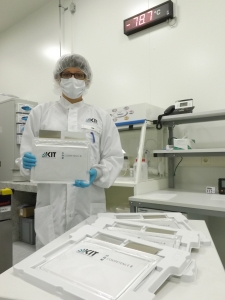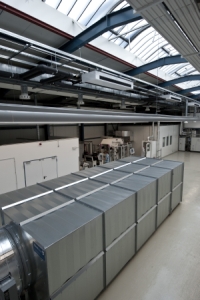A nationwide use of lithium-ion batteries in electric vehicles and stationary storage devices could be the key to a successful energy turnaround. A limited performance and efficiency, however, have so far been preventing these batteries from entering the market. The KIT now reacts by starting up a research factory for small series production of lithium-ion cells. The batteries that will be manufactured based on the new methods developed there will meet the enormous demands on product quality and efficiency.
„Eventually, this novel research infrastructure enables us to, at an early stage, evaluate, automate and make suitable for industrial use production processes that are still immature,” explains Professor Dr. Jürgen Fleischer who, with his team, is responsible for setting up the research factory and researching into production within the project “Competence E” at Karlsruhe Institute of Technology (KIT).
Both stationary storage devices and fast-charging vehicle batteries require low-cost and efficient lithium-ion cells. To obtain these, the research factory newly develops the necessary individual production steps. “We leave the path of conventional manufacture to develop completely new production and integration methods for lithium-ion cells,” Fleischer says.
New drying, coating and calendering techniques for electrode materials as well as new assembly methods for cells are developed together with the German mechanical engineering and industrial plant construction sector. With the M+W Group, a cooperation partner from Stuttgart, Germany, a new dry-room concept was implemented for manufacture of high-quality lithium-ion cells under extremely dry ambient conditions. The dew point, which is a measure of the dryness of the air, is almost -80°C. Such values are at the limit of what can be measured by hygrometers and, hence, set a new benchmark for the production of lithium batteries.
 High-quality batteries can be assembled in the dry-room at a dew point of almost -80°C. (Photo: KIT)
High-quality batteries can be assembled in the dry-room at a dew point of almost -80°C. (Photo: KIT)
“All interested companies creating value in Germany are invited to make use of the unique possibilities of our research factory,” says coordinator of the “Competence E” project, Dr. Andreas Gutsch. Cooperation may cover e.g., easy access to the production infrastructure, joint developments or contract research and development. The KIT-developed technologies will be tested in test runs and campaigns with larger series through to production maturity. In this way, economically promising production methods will be identified. KIT plans to offer licenses to eligible companies.
The manufacturing hall of almost 1,500 square meters is located on the premises of KIT’s Campus North. The first tools and equipment were procured in 2012 with the support of the Federal Ministry of Economics and Technology. The batteries will mainly be applied in electric commercial vehicles and stationary storage systems for private households and industry. For these potential applications, first models have been made available already during setup of the research factory. The model of a stationary battery storage device caused a stir among experts at this year’s Hanover and Intersolar fairs. At the IAA fair in September, KIT will introduce the prototype of a battery-electric city bus.
Being “The Research University in the Helmholtz Association”, KIT creates and imparts knowledge for the society and the environment. It is the objective to make significant contributions to the global challenges in the fields of energy, mobility, and information. For this, about 10,000 employees cooperate in a broad range of disciplines in natural sciences, engineering sciences, economics, and the humanities and social sciences. KIT prepares its 22,800 students for responsible tasks in society, industry, and science by offering research-based study programs. Innovation efforts at KIT build a bridge between important scientific findings and their application for the benefit of society, economic prosperity, and the preservation of our natural basis of life. KIT is one of the German universities of excellence.

